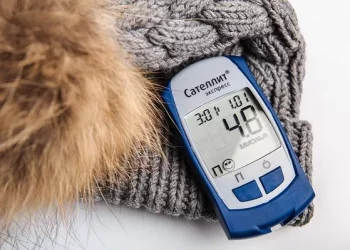Pharmacy students at the University of Nebraska Medical Center (UNMC) are gaining hands-on experience in diabetes management through a unique experiential learning initiative. As part of their diabetes management elective, third-year pharmacy students are stepping into the shoes of patients living with diabetes to better understand the challenges they face daily.
The “Living with Diabetes” program, spearheaded by faculty members Jessica Downes, PharmD, and Kristen Cook, PharmD, allows students to experience firsthand the complexities of managing the condition. The goal is to instill not only technical knowledge but also empathy—an essential skill for future pharmacists working with diabetic patients.
“Empathy is a big thing when dealing with patients who live with diabetes,” Dr. Downes explained. It’s easy for healthcare providers to question why patients are not adhering to blood sugar checks, but this program encourages students to understand the barriers patients face, such as the pain and inconvenience of frequent blood tests. To foster this understanding, students are tasked with pricking their own fingers up to four times a day.
Students also wear continuous glucose monitors (CGMs) and track their meals, insulin doses, and blood sugar levels, simulating the real-life management of diabetes. However, they quickly learn that technology, while helpful, can present new challenges. “We had people who did not set their alarms properly, and it would go off in the middle of class,” said Jackson Stensgard, a third-year student. Such interruptions can lead to social anxiety, underscoring the psychosocial toll of living with diabetes.
Meredith Ollerich, another third-year student, noted how her blood sugar levels fluctuated unexpectedly, especially after meals. A high-carb meal might not have as much of an impact as a small-carb meal, revealing the complexities of blood sugar regulation that many patients grapple with daily.
The experiential program aims to show that diabetes management is not just about targeting blood sugar levels and A1c goals. The real challenge lies in the emotional and psychological burdens that accompany the condition. “It can be overwhelming,” said Dr. Downes, highlighting the emotional toll that both patients and healthcare providers must navigate.
Many students, after completing the program, report a deepened empathy for those living with diabetes. After participating, 15 of 20 students expressed increased empathy for diabetic patients, with 13 recognizing how distressing an unexpected hospitalization can be for patients. Others noted how diabetes can affect personal relationships, adding another layer to the complexities of care.
The program has not only educated students on the scientific aspects of diabetes management but also encouraged them to consider the broader impact of the disease on individuals and their families. As pharmacy students move forward into their careers, this experiential learning will guide their interactions with future patients, helping them offer both technical expertise and compassionate care.
Related topics:
Non-Linear Relationship Between Fasting C-Peptide and Diabetic Retinopathy in Type 2 Diabetes
New Discovery Offers Hope for Diabetics: S100A9 Protein May Replace Insulin Therapy
Ultrasound Localization Microscopy as a Tool for Monitoring Type 2 Diabetes Progression
























